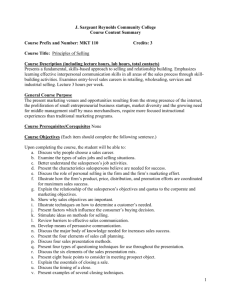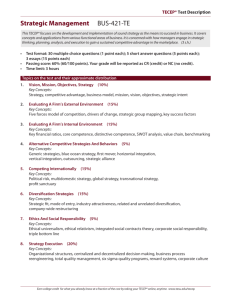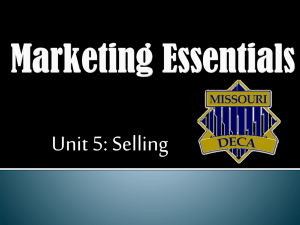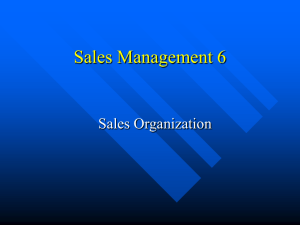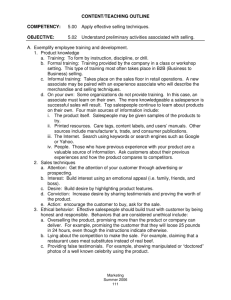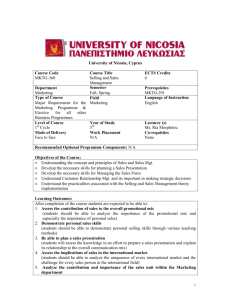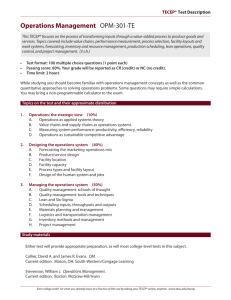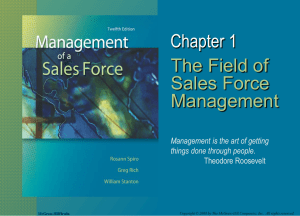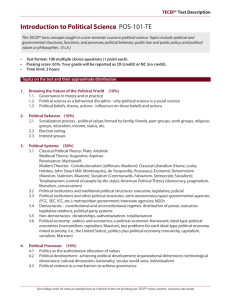Sales Management MAR-322-TE
advertisement
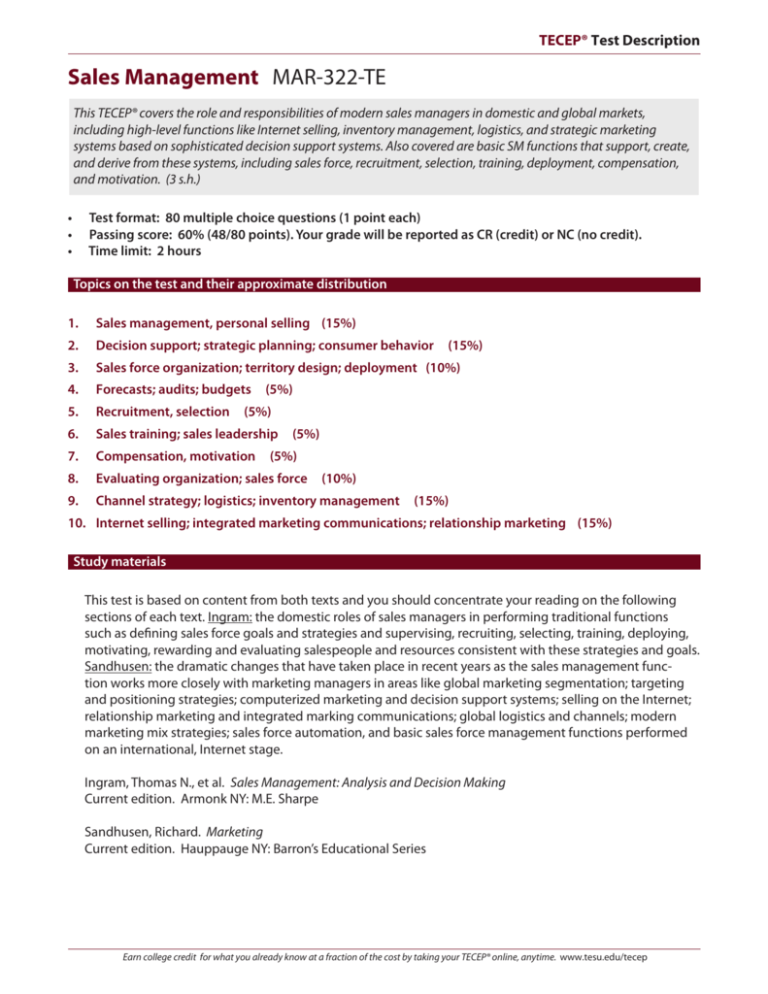
TECEP® Test Description Sales Management MAR-322-TE This TECEP® covers the role and responsibilities of modern sales managers in domestic and global markets, including high-level functions like Internet selling, inventory management, logistics, and strategic marketing systems based on sophisticated decision support systems. Also covered are basic SM functions that support, create, and derive from these systems, including sales force, recruitment, selection, training, deployment, compensation, and motivation. (3 s.h.) • • • T est format: 80 multiple choice questions (1 point each) P assing score: 60% (48/80 points). Your grade will be reported as CR (credit) or NC (no credit). Time limit: 2 hours Topics on the test and their approximate distribution 1. Sales management, personal selling (15%) 2. Decision support; strategic planning; consumer behavior 3. Sales force organization; territory design; deployment (10%) 4. Forecasts; audits; budgets 5. Recruitment, selection 6. Sales training; sales leadership 7. Compensation, motivation 8. Evaluating organization; sales force 9. Channel strategy; logistics; inventory management (15%) (5%) (5%) (5%) (5%) (10%) (15%) 10. Internet selling; integrated marketing communications; relationship marketing (15%) Study materials This test is based on content from both texts and you should concentrate your reading on the following sections of each text. Ingram: the domestic roles of sales managers in performing traditional functions such as defining sales force goals and strategies and supervising, recruiting, selecting, training, deploying, motivating, rewarding and evaluating salespeople and resources consistent with these strategies and goals. Sandhusen: the dramatic changes that have taken place in recent years as the sales management function works more closely with marketing managers in areas like global marketing segmentation; targeting and positioning strategies; computerized marketing and decision support systems; selling on the Internet; relationship marketing and integrated marking communications; global logistics and channels; modern marketing mix strategies; sales force automation, and basic sales force management functions performed on an international, Internet stage. Ingram, Thomas N., et al. Sales Management: Analysis and Decision Making Current edition. Armonk NY: M.E. Sharpe Sandhusen, Richard. Marketing Current edition. Hauppauge NY: Barron’s Educational Series Earn college credit for what you already know at a fraction of the cost by taking your TECEP® online, anytime. www.tesu.edu/tecep TECEP® Test Description Sample questions 1. The selling process for cold canvassing includes all of the following EXCEPT a. beginning with blind prospecting b. using a pre-approach c. following a lead from an inquiry d. utilizing close and follow-up 2. To determine which customer accounts to call on, companies need to evaluate a. geographic closeness to other accounts b. territory allocation c. commission schedules d. reference checks 3. To maximize the performance of their field sales forces, companies a. review expense accounts b. retrain in sales techniques c. develop a strong marketing plan d. develop a strong advertising plan 4. What aspect of an employment application should be scrutinized by the sales manager? a. Physical impairments b. Ethnic background c. Personal characteristics d. None of the above 5. Which of the following is an advantage of using a commission form of sales compensation? a. The salesperson will be highly motivated. b. Marketing information will be regularly collected by the salesperson. c. The account will be serviced on a regular basis. d. All of the above 6. All of the following are appropriate means for selecting salespeople EXCEPT a. interviews b. aptitude test scores c. political connections d. previous experience 7. Which of the following topics is NOT usually included in a sales training course? a. Sales technique b. Customer buying habits c. Company financial information d. Accounting techniques Earn college credit for what you already know at a fraction of the cost by taking your TECEP® online, anytime. www.tesu.edu/tecep TECEP® Test Description 8. Qualifying a prospect is a. identical with checking references for an applicant b. determining which applicant to hire c. conducting an exit interview d. determining if a prospect is interested in a product 9. Projection on the basis of past records is a method of a. value analysis b. sales forecasting c. standard appraisal d. MBO 10. Matching the capabilities of the sales recruit to the needs of the organization is called a. congruence b. realism c. selection d. socialization 11. Which of the following personal selling approaches is designed to help customers reach strategic goals through use of products, services, and sales organization expertise? a. Problem solving b. Consultative c. Need satisfaction d. Mental states 12. Which of the following areas of training for sales managers is most frequently neglected? a. Forecasting and budgeting techniques b. Accounting principles c. Marketing principles d. Management principles 13. Which of the following communication strategies does NOT involve direct communication between sales managers and salespeople? a. b. c. d. Manipulation Threats Persuasion Promises 14. Sales performance evaluations are necessary a. as a way for management to obtain their bonuses b. to supplement training c. to provide feedback to salespeople d. none of the above Earn college credit for what you already know at a fraction of the cost by taking your TECEP® online, anytime. www.tesu.edu/tecep TECEP® Test Description 15. Which of the following is NOT part of the sales process? a. The pre-approach b. Planning the sales presentation c. Prospecting d. Evaluating sales effectiveness Answers to sample questions 1. c 9. b 2. a 10. a 3. b 11. b 4. c 12. d 5. a 13. a 6. c 14. c 7. d 15. d 8. d Earn college credit for what you already know at a fraction of the cost by taking your TECEP® online, anytime. www.tesu.edu/tecep
